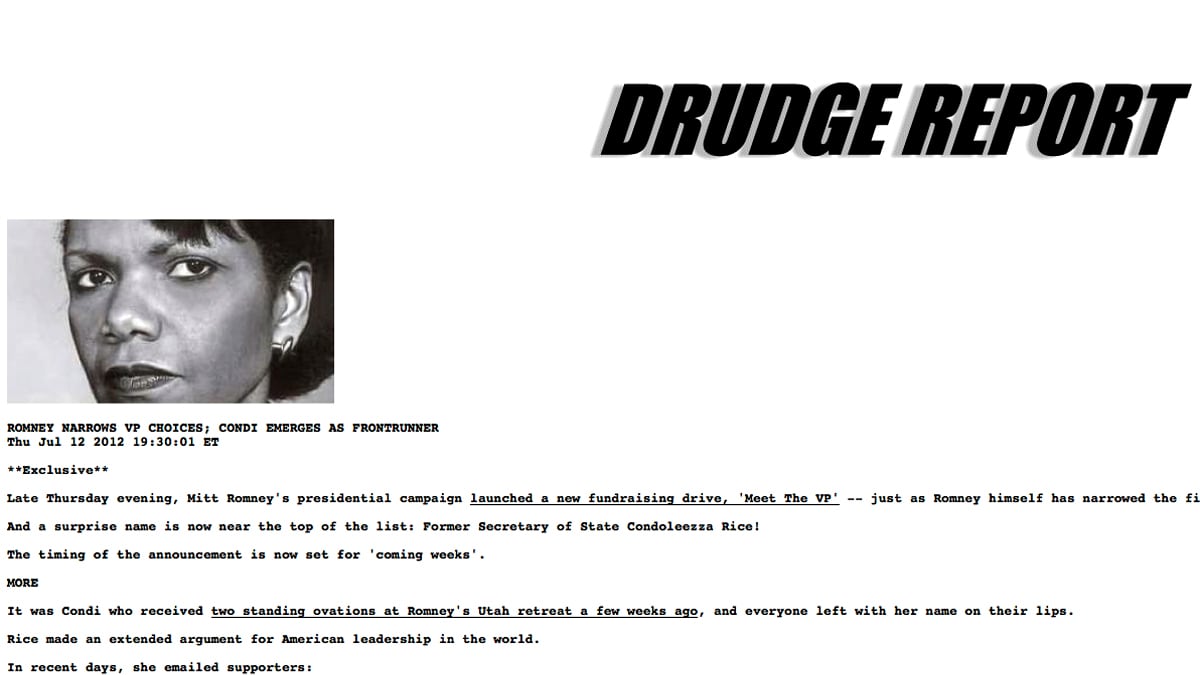The headline screamed across the homepage of the Drudge Report: ROMNEY NARROWS VP CHOICES; CONDI EMERGES AS FRONTRUNNER.

Matt Drudge—the shadowy, fedora-wearing Internet gossip machine who has boasted from day one that he is a conservative—crowed that his sources revealed former secretary of State Condoleezza Rice is at the top of the veep list. He even went so far as to punctuate the scoop with an exclamation point!
Bull. I’m a good enough poker player to know a campaign bluff when I see one. The claim is so ludicrous as to be laughable, and Drudge must know it considering his reported alliance with the Romney campaign.
Yet in typical fashion, the media—knowing the claim had little basis in reality—went along for the ride. The Today show, Good Morning America, CNN, Fox, MSNBC, even The New York Times and The Wall Street Journal, along with plenty of others, took the bait and devoted countless minutes and column inches to the tale.
The speculation spread like wildfire across the web, with The Daily Beast and Politico taking the “scoop” and running with it, spicing up the summer’s otherwise ennui-inducing campaign with titillating, but meaningless catnip journalism.
“The idea that Condi Rice, an African-American conservative woman could team up with a white-guy Mormon to take on an African-American, left-leaning Democrat is just too delicious for reporters to ignore,” says Frank Sesno, director of George Washington University’s School of Media and Public Affairs and a former Washington bureau chief for CNN.
So why not do it? Why shouldn’t news outlets take the opportunity to pooh-pooh the story as a way of driving clicks and ratings? Simple, Sesno says. If they don’t, someone else will. “The question in newsrooms now is “if ‘so many have seen it, heard it, read it, tweeted it, how can we ignore it?’”
Former New York Times reporter Steve Roberts, a columnist for the Los Angeles Times Syndicate, is critical—like others who covered news in the non-digital age—of the principles that guide too many websites: “We’re not telling you this is true, we’re just saying other people are reporting it.” He calls the process “highly unethical.”
“Redistributing the work of others is so easy and has become a form of news,” says Tom Rosenstiel, director of the Pew Research Center’s Project for Excellence in Journalism. Rosenstiel adds reporting on another journalist’s reporting raises serious questions about fact-checking someone else’s anonymous sources. “When you post something because it is out there and can get you attention, traffic, even revenue, are you responsible if it is wrong?”
Apparently not. It’s pretty obvious that most of those who picked up this story failed to vet it before blasting the claim to the world—or trumpeted it even if their own sources called the idea absurd. They know Drudge is a monster traffic-driver and that even if they ignore his tasty tidbits, their rivals won’t.
Eric Deggans, media critic for the Tampa Bay Times, raises the “meat and potatoes” argument. Instead of gorging on rumors, he would rather see reporters working hard to vet Romney and his positions. “I'm not sure we need so much journalism firepower trained on a story we ultimately can't know is true.”
In this case, mindlessly repeating the far-fetched scenario aided what was probably the intent of whoever whispered to Drudge: to suck the air out of the day’s other big news. That, of course, was the Boston Globe report that Romney remained as Bain Capital’s chief executive and sole stockholder through 2002—three years after he has insisted he left the firm.
Beyond the political distraction, there is some marginal benefit to the Romney campaign for Mitt to be seen as open-minded enough to consider a female African-American. This is, after all, the same candidate who was booed during his speech a day earlier to the NAACP.
In Washington politics, there is no such thing as a coincidence. Even if it were remotely true that Condi is at the top of Romney’s list—which it isn’t—the timing of the leak doesn’t pass the smell test. Both sides play this political game with great frequency.
But hey, score one for Drudge. He turned the entire press corps upside down with an off-the-record source, or sources. Anyone who has even remotely followed the veepstakes already knows that Rice has denied the possibility, saying, “I don’t see myself in any way in elected office.” What part of “no” doesn’t Drudge understand? Maybe Drudge simply doesn’t want to accept her answer?
Despite his criticism of Drudge, Roberts throws him a small bone: “Condi Rice might not be a serious candidate for vice president, but she’s a serious person. At least Drudge wasn’t promoting Kim Kardashian for the ticket. Or Donald Trump.”
The litany of political reasons why it wouldn’t happen is as long as the distance to the man in the moon. Rice has said she is pro-choice, may not have voted for John McCain in 2008, and her positions on gun control, immigration, education, and gay marriage don’t seem to completely jibe with the party line. Her involvement in launching the war in Iraq and high-profile role under George W. Bush would muddy the Romney camp’s main message on the economy. That’s a whole lotta differences that could derail Romney’s chances.
It’s a bellwether of the Internet age that just about anyone can make anything go viral, true or not. Cable news, desperate for fresh meat, will always chase after the latest shiny object, even when journalists know the premise is silly. If the news had been about Tim Pawlenty—a serious contender for VP—surging to the top of the list, repeating the exclusive would make sense. But then forget the front-page treatment, and the possibility of even an iota of increased readership/viewership.
Rosenstiel says that the ethics and implications of the new role of redistributors of news—and, for that matter, aggregators—is something that has not been thought through. “Is it enough to say I don’t care if what I pass along is true?”
Good question. We live in a 24/7 news cycle that gives every pontificating pundit and boastful blogger the chance to spin thousands of others. It’s a dangerous weapon that, in this case, misfired.




